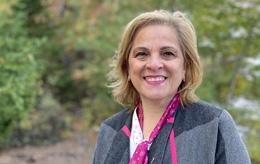New Minister Faces Pressure to Fix Canada’s Broken Immigration System

By Mata Press Service
Lena Metlege Diab, the newly appointed Minister of Immigration, Refugees and Citizenship, inherits one of the most politically volatile and operationally strained portfolios in Prime Minister Mark Carney’s new cabinet.
As the MP for Halifax West assumes the role this week, she faces a growing storm of challenges: an unprecedented surge in asylum claims from international students, an overstretched refugee adjudication system with more than 281,000 backlogged cases, and widespread concern from economists, immigration lawyers, and advocates over the government’s new approach to “sustainable immigration.”
According to new federal data, international students filed a record 20,245 asylum claims in 2024—almost double the previous year’s figure and six times higher than in 2019. The first three months of 2025 alone saw more than 5,500 such claims, a 22 per cent year-over-year increase, suggesting this year could surpass all previous records.
At the same time, immigration lawyers say policy changes are forcing students to pursue asylum as a last resort due to fewer permanent residency options and shrinking post-graduation pathways.
“When legitimate pathways are blocked, people don’t just give up…they look for the next available door,” said one immigration lawyer. “Right now, that door is the asylum system.”
Diab steps into the post amid Carney’s pledge to cap the number of temporary residents—including international students and foreign workers—to below five percent of the Canadian population by 2027. That would be a significant drop from the current 7.3 percent.
Carney has insisted that the cap will relieve pressure on housing, infrastructure, and social services. But economists say the math doesn’t add up.
CIBC deputy chief economist Benjamin Tal warned that Ottawa continues to undercount the actual number of non-permanent residents (NPRs) in Canada, leading to flawed policy decisions.
Statistics Canada assumes visa holders leave within 120 days after their permits expire, yet many stay, waiting on renewals or permanent residency—an issue that may be impacting hundreds of thousands of undocumented migrants.
As of January 2025, more than three million NPRs reside in Canada, and advocates warn that tightening immigration controls without fixing data gaps and processing delays could worsen housing shortages and erode public confidence.
The Canadian Immigration Lawyers Association (CILA) issued a detailed letter to Minister Diab this week, urging immediate engagement and offering a roadmap for reform. Representing more than 540 lawyers across the country, the association warned that client experience is deteriorating due to technological issues, long delays, and poor communication from Immigration, Refugees and Citizenship Canada (IRCC).
“While we appreciate digital innovation, we remain concerned about vulnerable applicants' ability to navigate the system,” said CILA in the letter. The association called for safeguards to ensure immigration lawyers remain central to the process, particularly to avoid incomplete or fraudulent submissions.
Program integrity is another major concern. CILA reiterated its call for a 15-point national strategy to combat immigration fraud, including better regulation of foreign consultants, public education campaigns, whistleblower protections, and increased penalties for bad actors.
The exponential rise in asylum claims from international students has further complicated the immigration narrative. Many of these students claim they fear persecution if returned home, and each case must be evaluated on its own merits.
However, critics argue that the system is being misused in part because of Ottawa’s increasingly restrictive policies. IRCC cut international study permits by 40 per cent last year, restricted work hours for students, and limited spousal permits. These reforms, introduced by former Minister Marc Miller to crack down on “diploma mills,” have created new choke points within an already overloaded system.
While IRCC maintains that the asylum claim rate remains small compared to the total number of permit holders, the impact on Canada’s refugee system is unmistakable. The Immigration and Refugee Board is now saddled with nearly 300,000 unresolved cases, forcing many legitimate claimants to wait years for hearings.
“Minister Diab is stepping into a political and operational minefield. On one side, there’s mounting pressure from Canadians concerned about housing shortages and public service strain. On the other hand, are vulnerable migrants, thousands of whom are stuck in legal limbo or vulnerable to fraud,” an immigration consultant told the Post via email.
Diab, is a seasoned lawyer and veteran of both provincial and federal politics, succeeds Rachel Bendayan in Carney’s first cabinet, after he was elected.
Born in Halifax to Lebanese immigrant parents, Diab brings to the role a unique blend of lived experience and professional expertise. She made history in Nova Scotia as the province’s first female Attorney General and later served as Minister of Immigration, where she led initiatives to expand newcomer programs and promote the province as a welcoming destination.
Elected federally in 2021 as the Liberal MP for Halifax West, Diab has been a strong advocate for diversity, fairness, and inclusion. Her legal background—combined with over two decades of practice and community leadership—has informed her consistent push for equitable access to immigration pathways.
Fluent in English, French, and Arabic, Diab has also been a prominent voice for both Francophone and immigrant communities.









